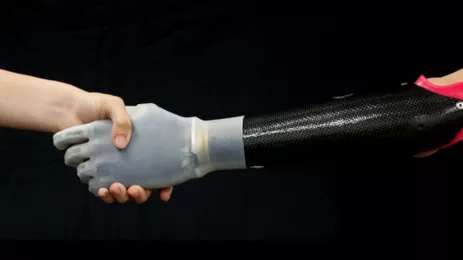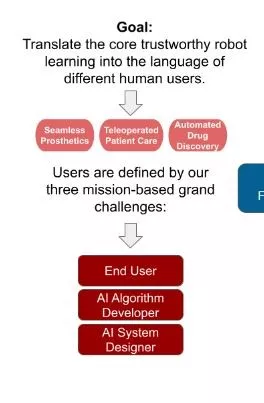ONE MUNICH - Human Centered Robotics (HCR): Developing robotics for applications in the health sector

Exploiting regional synergy potentials is the core objective of the ONE MUNICH strategy. In robotics, the Technical University of Munich (TUM) collaborates with the Ludwig Maximilian University of Munich (LMU) and the Helmholtz Association. This involves research into embodied AI, robot learning and decision-making, and interaction with humans in healthcare.
Analyse limits of embodied artificial intelligence, develop sophisticated solutions for learning and decision-making robots and create human-robot interaction that is as natural as possible: These are the most important scientific steps to develop a contemporary robotic system in the ONE MUNICH project Human Centered Robotics (HCR).
This will involve three use cases in which, among other things, learning robots are to be integrated into people's everyday lives. Specifically, this involves intelligent prosthetics, telemedical applications and automation in drug development.
The technological platform of the Human Centered Robotics research project
The following technological building blocks are essential for this development.
- Cybernetic body: Wearable sensors transmit human signals to a robotic system such as a prosthesis, which in turn feeds its information back to the human.
- Digital Twin: To reduce the distance between the robot and the human, a digital twin is used. This avatar is a digital image of the body of a human being who will ultimately be treated by teleoperation. Advantage: Only on the basis of people's digital bodies algorithms and thus also artificial intelligence can be used.
- Intelligent helper in the lab: Robots are increasingly performing their tasks in the laboratory independently. The human being assigns tasks to the assistants, which they then plan and execute themselves.
These technological platforms are the basis for breaking down and automating traditional workflows in the life sciences, as well as exploring "embodied" artificial intelligence, where bodies like robots harness the potential of artificial intelligence such as machine learning for themselves.
More about the individual research fields can be found here:
https://human-centered-robotics.de/research-fields/
Running time: 10-21 to 9-24
Budget TUM (MIRMI und RSI): 3 Million Euro
Research Management
Sandra Hirche (TUM), Sami Haddadin (TUM), Gitta Kutyniok (LMU), Albrecht Schmidt (LMU)
Website of research project Human Centered Robotics (HCR):
https://human-centered-robotics.de/
HCR is one of the three current research projects within the framework of the ONE MUNICH strategy of TUM and LMU: www.tum.de/innovation/oekosystem-muenchen
